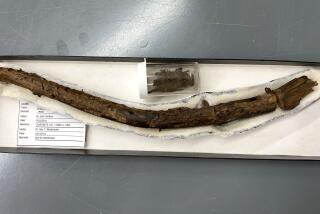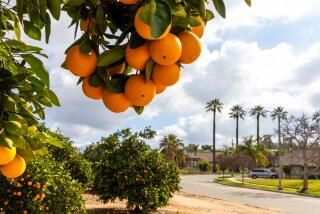Long-Term State Citrus Damage Seen : Agriculture: Young trees are dying from freezing weather. Some farmers give up on this year’s fruit production.
The cold snap that already has devastated this year’s citrus crop could also dramatically curtail the number of lemons, oranges and avocados produced next year, farmers and agricultural officials said Sunday.
Some farmers expect their citrus production to be half of normal next year because the cold weather is killing young orange and lemon trees and ravaging new growth on older trees.
Avocado production in Tulare County is likely to be wiped out for 1991, said county agricultural commissioner Lenord Craft. Tulare farms about 11,000 acres of avocados, which are a $3-million crop annually.
“We are looking at not even having an avocado crop in Tulare next year,” Craft said.
Farmers interviewed Sunday said they were no longer trying to save this year’s fruit. What was still on the trees--for navel oranges, about 80% of the crop--is nearly all lost, farmers said.
“I didn’t pick an orange,” said Keith Nilmeier, a Fresno citrus grower. “We gave up on our field.”
Farmers said they were concentrating on saving their trees. If the trees die in great numbers, it could have a long-range impact on the state’s fruit production and its economy. California produces about half the nation’s fruit and vegetables, supporting a $17.5-billion industry.
The economic toll of the recent freeze is expected to top $1 billion. Oranges and lemons worth hundreds of millions of dollars have been destroyed. Acre upon acre of broccoli, artichokes and celery are lost. About 15,000 Northern California farm workers are expected to lose their jobs, and innumerable others are losing business in a wide array of related industries such as trucking and shipping.
The impact in future years should be considerably less. But if fruit production is substantially curtailed in 1991, it will mean fewer jobs for pickers, packers, truckers, crate manufacturers and many others.
The biggest long-range concern is the health of citrus and avocado trees, farmers said. It takes up to five years to bring new trees into full fruit production, therefore lost trees set farmers back significantly.
At this point, farmers have no way of knowing how many trees will die. Most believe that they will not be able to tally their losses until spring. Many already have seen bark splitting and cracking, which means that the new growth--which supports next year’s crop--is in jeopardy.
“We have some severe bark-splitting in both the lemons and the oranges,” said Lee Bailey, of Bailey Brothers, a large citrus grower in Orange Cove. “We’d be lucky to have half to a third of our crop next year.”
Farmers continue to battle the cold. Although temperatures were rising this weekend, many areas were plagued with below-freezing weather.
Lows reported early Sunday by the National Weather Service include 16 degrees in Lancaster, 18 in Redding, 25 in Fresno, 24 in Stockton and Sacramento, 26 in Bakersfield and 30 in Imperial. Temperatures are expected to rise during this week into the 40s and 50s through much of Northern California, where the freeze hit hardest.
Meanwhile, Southern California is enjoying much milder weather, which is expected to continue for at least several days, said National Weather Service specialist Betty Reo. The high temperature today is expected to reach the mid to high 60s at the Los Angeles Civic Center. New Year’s Day should dawn chilly but warm later to the low 70s.
A second storm that was expected to hit this weekend was not as severe as anticipated. “The storm went due east and we just got the tail end of the effects,” Reo said. A northeasterly wind helped keep temperatures up, she added.
Ventura County farmers were spared further damage to hard-hit crops during the first week of winter.
“We seem to have dodged a major bullet,” said a relieved Rex Laird, executive director of the Ventura County Farm Bureau. “We were expecting a front that was going to be even colder than the one that hit us last week. But it seems to have veered over toward Arizona.”
As a result, he said, the county’s farmers--some of whom stayed up all night Saturday prepared to turn on smudge pots and wind machines--reported no significant damage from the latest edition of the so-called Yukon Express.
For the next week, the farmers’ improved luck should hold, said National Weather Service meteorologist Terry Schaeffer. He predicted gradually moderating temperatures, with westerly winds bringing increased humidity by the end of the week. Such conditions generally favor farmers, he said.
Although Northern California temperatures are still worrisome to farmers, they are substantially better than what had been expected only days ago, when weather forecasts called for another weekend of freezing cold.
Farmers said they were using wind machines and water to raise field temperatures the few degrees needed to save the older trees. Young trees around the perimeter of many farms are already lost, farmers said. Some estimated that as many as 20% of the 3- to 4-year-old trees also would fall victim to the cold.
“There is quite a bit of die-back,” said Craft. “The trees that are under 4 years old that were unprotected are going to die. But some trees that were protected will do fine. We don’t have any way of estimating at this point what percentage of the trees are hurt.”
Vegetable crops also have been severely damaged by the freeze. Farmers said there would only be a short-term impact from the loss of broccoli, celery and artichoke crops because these vegetables are planted and harvested in three-month cycles.
Trees are another story.
“We are just trying to maintain the integrity of our bud woods,” said Nilmeier. “The mature trees won’t die, but we could be looking at a half-crop or less for next year.”
Times staff writer Judy Pasternak and correspondent Jack Searles contributed to this story.
More to Read
Inside the business of entertainment
The Wide Shot brings you news, analysis and insights on everything from streaming wars to production — and what it all means for the future.
You may occasionally receive promotional content from the Los Angeles Times.










